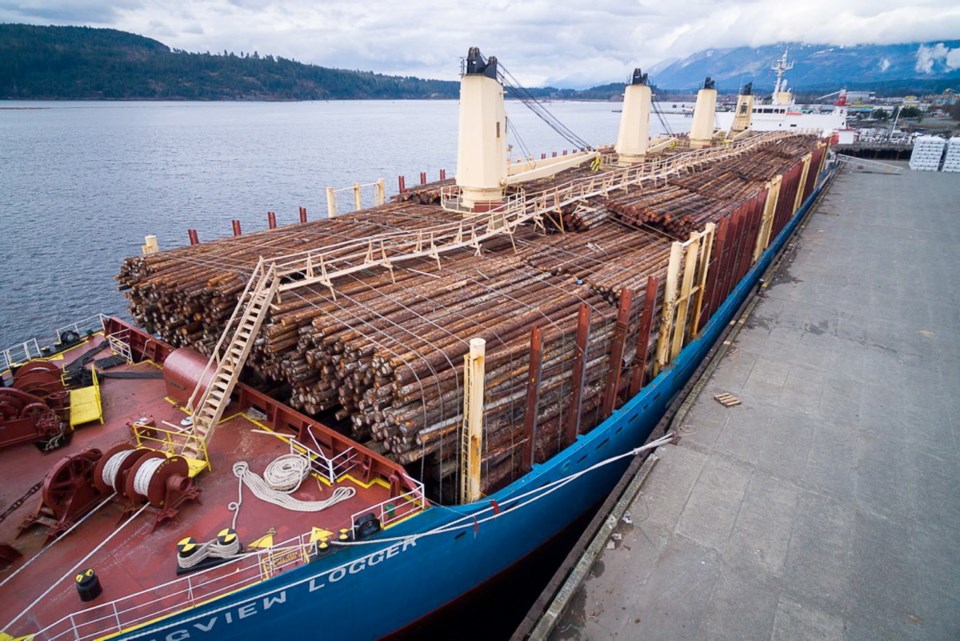Environmental groups and some unions are calling on the province to change its policy regarding the export of raw logs.
The Ancient Forests Alliance, Sierra Club of British Columbia and the Wilderness Committee have joined with unions representing pulp and paper workers to ask the government to ban exports from old-growth forests, impose higher taxes on second-growth exports and introduce policies that would require more value-added manufacturing in the province.
“Last year, B.C. forest companies exported enough raw logs to frame nearly 134,000 homes, which equals roughly half of Vancouver’s single-family homes,” said Arnold Bercov, president of the Public and Private Workers of Canada. “Thousands of good-paying jobs in rural communities are at risk every day that the government fails to act.”
That assertion is based on a research paper from the Canadian Centre for Policy Alternatives that suggested between 2013 and 2016, more raw logs were shipped from B.C. than during any other four-year period in the province’s history.
According to the centre, nearly 26 million cubic meters of raw logs were shipped from B.C. over the last four years.
Had that wood been processed in the province, it could have generated 3,600 new jobs, the paper said.
“One huge concern for forest industry workers and environmental organizations alike is that the door appears to be wide open for companies to close sawmills and simply increase their log exports,” said CCPA researcher Ben Parfitt. “That is a recipe for disaster for our environment, our economy and rural and First Nation communities.”
But the forest companies and the government argue the export of logs is an essential part of the forest industry.
“First of all, we don’t agree with the outcome or the assertions made in terms of the [job] numbers. What we do know is log exports are part of an integrated forest sector, and further restrictions on log exports would result in job losses ... it would not create additional jobs,” said Minister of Forests Steve Thomson.
Thomson noted overall log exports account for less than seven per cent of the total harvest in B.C.
Thomson also pointed out logs are first made available to the domestic market before they can be sold overseas, and high-value logs such as western red cedar cannot be exported.
Rick Jeffery, president of the Coast Forest Products Association, won’t argue that log exports have increased, but he points out the total harvest has also increased, resulting in jobs in B.C..
“Exports have climbed since 2008 to somewhere in the six million cubic metres range, and that is almost entirely the China phenomenon. There’s a significant demand for logs in China as there is a significant demand for lumber, and we have been very successful in selling hemlock lumber and hemlock logs into the China market,” Jeffery said.
He also noted that without log exports it would not be economical to harvest in some remote regions.
Jeffery said there are two types of log exports. The bulk of them go through the surplus test and are put on the market for any domestic mill to bid on before being exported.
The second are logged under provincial orders-in-council that allow exports from timber stands in remote regions that might not have manufacturing facilities or where logging would be too difficult and expensive otherwise.
“So they export a portion of it and the rest appears in front of domestic sawmills,” Jeffery said. “The log exports provide jobs for loggers, First Nations, longshoremen and the like, but it also offers a supply of logs to domestic sawmills that wouldn’t be available otherwise.”
Jeffery disagrees with the assertion the logs exported represent jobs sent offshore, and noted there would be job losses for loggers, sawmill workers and everyone involved in the industry down the line. “There would be significant numbers of job losses if we didn’t [export] ... there would be considerable contraction in both logging and manufacturing on the coast,” he said.



